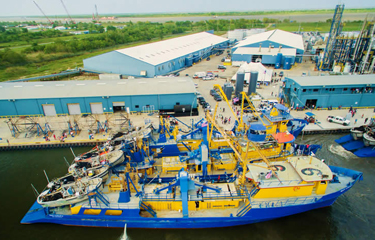Cape Town, South Africa-based Oceana Group has finally published its provisional consolidated results for the year ending 30 September, 2021, with its board of directors describing the trading period as a “difficult year.”
Oceana delayed publication of its results after a whistleblower raised concerns regarding accounting procedures for Daybrook Fisheries Incorporated, the company’s U.S. subsidiary. The company also has a 25 percent stake in New Orleans, Louisiana U.S.A.-based WestBank Fishing, which owns the vessels used by Daybrook Fisheries.
Separately, the company's auditors raised a new concern in February 2022 regarding the dating of signatures on an internal document pertaining to an insurance claim in the amount of USD 4.2 million (EUR 3.8 million). The issue was then independently investigated, delaying the publication of the results even further.
In a statement, Oceana's board of directors assured shareholders none of the issues for which it was investigated, including the insurance claim, impacted the company’s results.
“The Oceana board views the practice of backdating documents in a serious light and is implementing appropriate remedial interventions to address this, which includes disciplinary action and training,” Oceana said.
Oceana also announced, soon after the resignation of its previous CEO, Imraan Soomra, on 14 February, 2022, that the company is under investigation by South Africa’s Financial Sector Conduct Authority. According to the company, the FSCA initiated the investigation to “determine whether any person may have published false, misleading, or deceptive statements, promises, and forecasts regarding the past or future performance of the company, or its securities.”
Oceana said it has not yet received the details of the investigation but that it “will cooperate fully with the FSCA.”
Oceana's total revenue dipped 8.1 percent to ZAR 7.6 billion (USD 503.8 million, EUR 458.4 million) in 2021. Oceana’s operating profit was down 14.3 percent to ZAR 1.2 billion (USD 78.2 million, EUR 71.1 million), and its as was headline earnings and profit before tax dropped 11.2 percent and 12 percent, respecitvely, to ZAR 652 million (USD 43 million, EUR 39.6 million) and ZAR 1 billion (USD 66 million, EUR 60 million).
“During the past financial year, the group has demonstrated agility and resilience despite the ongoing impact on supply from COVID-19 and extraordinary events, including civil unrest and severe weather,” Oceana Group Interim CEO Neville Brink said. “The key challenge has been supply, and not the demand for our products.”
The stalling of the company’s horse mackerel mid-water trawl vessel, Desert Diamond, after engine damage, and the unrest in KwaZulu-Natal after the arrest of former South Africa President Jacob Zuma on corruption allegations, also hit Oceana’s overall performance, the company said. Oceana lost an estimated ZAR 86 million (USD 5.6 million, EUR 5.1 million) during the KwaZulu Natal unrest.
Hurricane Ida, which made landfall in the U.S. on 29 August, 2021, led to closure of the company’s plant in Lane Empire, Louisiana, U.S.A. Post-hurricane fishing conditions were challenging, the company said, "contributing to further reduced landings through September.”
Oceana’s U.S. fishmeal and fish oil operations reported lower catch rates and lower production volumes that pushed down their operating profit by 44 percent to ZAR 236 million (USD 15 million, EUR 14.3 million) from ZAR 425 million (USD 28 million, EUR 25.7 million). The decline in revenue and operating profit was exacerbated by an 11 percent strengthening of the rand, South Africa's currency.
COVID-19 related costs and global shipping container shortages, coupled with port access difficulties, further constrained Oceana’s canned fish and cold-storage operations, it said.
Revenue from Oceana’s Africa-based canned fish and fishmeal business dipped 8 percent from ZAR 4.4 billion (USD 293 million, EUR 266 million) to ZAR 4.1 billion (USD 273 million, EUR 248 million). The company’s canned pilchard sales volume in South Africa dropped 5 percent due to “tough trading conditions in the first half of the year,” which was partially offset by an 11 percent increase in the African market, where there was an increase in demand for the products from neighboring countries, Oceana said.
However, Oceana posted a 9 percent growth in operating profit on its horse mackerel, hake, lobster, and squid operations.
Oceana said it was successful in all its applications through South Africa's recently completed fishing rights application process, through which it was allocated 15-year rights for several fisheries, running through 2037. The allocations were materially in line with previous allocations and an additional application for pole-caught tuna rights was awarded, Oceana said.
Brink said he is optimistic that despite 2021 having been a difficult year for Oceana, the company should have turnaround in performance “driven by the good demand for its products and the securing of its fishing rights.”
But Oceana said the ongoing war in Ukraine, triggered by Russia's invasion, could trigger a surge in oil prices that could pressure company’s operational costs in 2022.
Photo courtesy of Oceana Group







